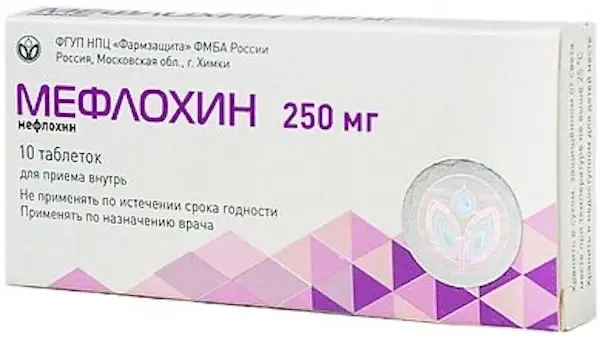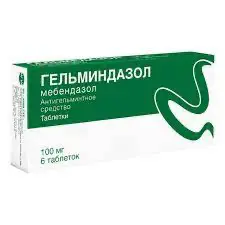Description
Mefloquine Pharmacodynamics
Mefloquine is active against asexual intracellular erythrocytic forms of human malaria pathogens Plasmodium falciparum, Plasmodium vivax, circulating schizonts Plasmodium malariae and Plasmodium ovale. It is not active against liver stages of parasites. Effective against malaria pathogens resistant to other antimalarial drugs, such as chloroquine, proguanil, pyrimethamine and combination of pyrimethamine and sulfonamides. For
P. falciparum, resistance to mefloquine may have developed mainly in Southeast Asia. Cross-resistance between mefloquine and halofantrine, mefloquine and quinine has been noted in some regions. National expert organizations should be consulted for up-to-date information on resistance in different geographic regions.
The drug does not cause hemolysis associated with glucose-6-phosphate dehydrogenase deficiency.
Indications
Treatment of mild and moderate forms of malaria caused by strains of P. falciparum resistant to other antimalarial drugs, P. vivax and malaria of mixed etiology.
Given that sensitivity may vary over time and from one geographic area to another, it is recommended that national and international guidelines be followed.
Prophylaxis of malaria in persons traveling to malaria-risk regions, especially in regions with a high risk of infection by strains of P. falciparum resistant to other antimalarial drugs.
Emergency therapy (self-medication): Self-treatment as emergency treatment in case of suspected malaria, if no immediate medical help is available.
Contraindications
Hypersensitivity to mefloquine, any component of the drug or to drugs close to it (quinine, quinidine).
Concomitant use with halofantrine, use of halofantrine after therapy with mefloquine during 15 weeks after cessation of the latter.
Concomitant use with ketoconazole, administration of ketoconazole after therapy with mefloquine within 15 weeks after cancellation of the latter.
Prophylactic use in active depression and severe mental disorders, seizures (including history).
Children under 3 months of age or with body weight less than 5 kg (experience of using the drug is limited).
Lactose intolerance, lactase deficiency, glucose-galactose malabsorption (due to the presence of lactose in the drug).
Caution
Hepatic insufficiency, epilepsy, mental diseases, heart diseases, age over 65 years. In combination with quinine and quinidine.
Usage during pregnancy and lactation
Pregnancy
In administration of Mefloquine in doses 5-20 times higher than therapeutic for humans, it had teratogenic effect in mice and rats and embryotoxic effect in rabbits. However, clinical experience with Mefloquine has not shown any embryotoxic or teratogenic effects. Nevertheless, Mefloquine should be administered in the first trimester of pregnancy only if the expected benefits to the mother exceed the potential risk to the fetus. Women of reproductive age should be prescribed treatment only if reliable contraception is used for the duration of Mefloquine and 3 months after the last dose. But in case of pregnancy during chemoprophylaxis with Mefloquine there are no indications for its termination.
When prescribing Mefloquine to pregnant women, refer to current international guidelines (e.g., WHO).
Breastfeeding period
The activity of small amounts of mefloquine in breast milk is unknown. No adverse reactions have been reported in breastfed children whose mothers have taken Mefloquine.
Current international guidelines (e.g., WHO) should be consulted when prescribing Mefloquine to breastfeeding mothers.
Dosage and administration.
- Inside, after a meal with plenty of fluid (at least 200 ml), 2-3 times.
- Mefloquine has a bitter and slightly bitter taste. The tablets should be swallowed whole. When prescribed for children or people who cannot swallow the tablet whole, it may be crushed and dissolved in a small amount of water, milk or other drink.
- Do not take the tablets out of the blister until after you have taken them, as they are sensitive to moisture.
- Prophylaxis
- Standard dosage regimen
- Adults and children with body mass over 45 kg – 5 mg/kg (250 mg, 1 tablet) 1 time a week. Adults and children with body mass of 30-45 kg – 3/4 of tablet; 20-30 kg – 1/2 of tablet; 10-20 kg – 1/4 of tablet and if body mass 5-10 kg – 1/8 of tablet (approx. 5 mg/kg of body weight). Exact doses of the drug for children with body weight less than 10 kg, if possible, should be prepared and given by pharmacists.
- Weekly doses of Mefloquine should always be taken on the same day of the week. The first dose should be taken at least one week before arrival in a malaria-endemic region.
- Dosage in special cases – If preventive treatment for malaria has not been started at least one week before the arrival to the malaria-endemic region, a shock dose equal to a weekly dose of Mefloquine taken daily for 3 days should be prescribed and then the standard dosage regimen should be switched to. The use of shock doses of the drug increases the likelihood of adverse events. To reduce the risk of malaria after leaving the endemic region, prophylaxis is continued for another 4 weeks. If the patient takes other drugs, it is advisable to start prophylaxis 2-3 weeks before departure to ensure good tolerance of simultaneously taken drugs (see section “Interaction with other medicinal products”). If malaria develops during prophylaxis with Mefloquine, the doctor should carefully consider which drug to choose for therapy. For prescribing halofantrine, see “Interactions with other medications.”
- Treatment
- Standard dosing regimen
- The recommended total therapeutic dose of mefloquine is 20-25 mg/kg.
- Body weight (kg) Total dose Distribution of dose per administration*
5-10 1 tablet
10-20 1-2 tablets
20-30 2-3 tablets 2+1 tablets
30-45 3-4 tablets 2+2 tablets
45-60 5 tablets 3+2 tablets
>60 6 tablets 3+2+1 tablets
* Distribution of the total therapeutic dose into 2-3 doses 6-8 hours apart can reduce the frequency and severity of side effects.
- There is no experience of using total doses exceeding 6 tablets in overweight persons.
- Dosing in special cases
- Mefloquine is indicated for the treatment of uncomplicated malaria caused by P. falciparum. It is common practice to use combination therapy for uncomplicated malaria caused by P. falciparum. Since the sensitivity of the pathogen may vary over time and from one geographic area to another, it is recommended that national and international guidelines be followed during therapy.
- For persons with partial immunity against malaria, such as residents of malaria-endemic regions, a lower total dose may be sufficient.
- If vomiting occurs within 30 minutes of taking the drug, the full dose of Mefloquine should be repeated. If vomiting occurs 30 to 60 minutes after ingestion, an additional half dose should be administered.
- After treatment of malaria caused by P. vivax, prophylaxis of recurrences with drugs that are derivatives of 8-aminoquinoline (such as primaquine) is indicated to eliminate hepatic forms of plasmodia.
- If a full course of treatment with Mefloquine after 48-72 hours does not result in improvement of the patient’s condition, it is necessary to consider prescribing another agent. If malaria develops during prophylaxis with Mefloquine, the physician should carefully consider which drug to choose for therapy. See “Interaction with other medicines” for information on prescribing halofantrine.
- In severe acute malaria, Mefloquine may be administered after an initial course of intravenous quinine therapy of at least 2-3 days. Most drug interactions leading to development of adverse reactions can be prevented if Mefloquine is taken not less than 12 hours after the last dose of quinine.
- In regions with multidrug-resistant malaria pathogens, initial treatment with artemisinin or its derivatives may be appropriate, followed if possible by therapy with Mefloquine.




